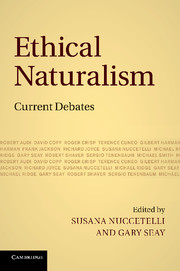Book contents
- Frontmatter
- Contents
- Contributors
- Introduction
- Chapter 1 Naturalism in moral philosophy
- Chapter 2 Normativity and reasons: five arguments from Parfit against normative naturalism
- Chapter 3 Naturalism: feel the width
- Chapter 4 On ethical naturalism and the philosophy of language
- Chapter 5 Metaethical pluralism: how both moral naturalism and moral skepticism may be permissible positions
- Chapter 6 Moral naturalism and categorical reasons
- Chapter 7 Does analytical moral naturalism rest on a mistake?
- Chapter 8 Supervenience and the nature of normativity
- Chapter 9 Can normativity be naturalized?
- Chapter 10 Ethical non-naturalism and experimental philosophy
- Chapter 11 Externalism, motivation, and moral knowledge
- Chapter 12 Naturalism, absolutism, relativism
- Bibliography
- Index
Introduction
Published online by Cambridge University Press: 05 January 2012
- Frontmatter
- Contents
- Contributors
- Introduction
- Chapter 1 Naturalism in moral philosophy
- Chapter 2 Normativity and reasons: five arguments from Parfit against normative naturalism
- Chapter 3 Naturalism: feel the width
- Chapter 4 On ethical naturalism and the philosophy of language
- Chapter 5 Metaethical pluralism: how both moral naturalism and moral skepticism may be permissible positions
- Chapter 6 Moral naturalism and categorical reasons
- Chapter 7 Does analytical moral naturalism rest on a mistake?
- Chapter 8 Supervenience and the nature of normativity
- Chapter 9 Can normativity be naturalized?
- Chapter 10 Ethical non-naturalism and experimental philosophy
- Chapter 11 Externalism, motivation, and moral knowledge
- Chapter 12 Naturalism, absolutism, relativism
- Bibliography
- Index
Summary
This collection offers new perspectives on ethical naturalism, narrowly construed as the conjunction of two core theses. One holds that there are moral properties and facts, the other that at least some such properties and facts are natural properties and facts. Thus understood, ethical naturalism is distinct from, though usually motivated by, philosophical naturalism, a more general metaphysical outlook according to which all there is is the world as conceived by science. Clearly, philosophical naturalism does not entail ethical naturalism, for it is compatible also with eliminativist accounts of morality that either reject the ethical naturalist’s core theses altogether (as in the error theory) or deflate them substantially (as in quasi-realism). But while eliminativism, especially in its various non-cognitivist forms, was a driving force through much of the twentieth century, ethical naturalism fell out of favor among philosophical naturalists until near the century’s end, perhaps as a result of having faced, early on, intuitively forceful objections such as G. E. Moore’s 1903 open question argument. In the last thirty years, however, increasing doubts about the cogency of those objections, together with some key developments in philosophy of mind and language, have contributed to a widespread renewal of interest in ethical naturalism.
For many philosophical naturalists now, one appeal of ethical naturalism is its core thesis that there are moral properties and facts, especially when read as claiming that such properties and facts are mind- and language-independent. On this, ethical naturalists compete with non-naturalists, who also hold a thesis with a realist gloss, in conjunction with their defining claim that at least some such moral properties and facts are irreducible, non-natural properties and facts. But the latter claim appears to commit non-naturalists to a moral ontology and an epistemology that are at odds with philosophical naturalism. Thus non-naturalism, in spite of its initial influence, has appeared less attractive to naturalistically minded philosophers for whom the very notion of a non-natural property or fact seems metaphysically extravagant. Moreover, although it is now widely accepted that the moral supervenes on the natural, critics doubt that non-naturalists can explain how irreducible moral properties and facts could supervene on natural properties and facts (see Ridge, this volume). These and other apparently compelling objections to non-naturalism are among the factors that have contributed indirectly to the current attraction of ethical naturalism for philosophers inclined toward moral realism.
- Type
- Chapter
- Information
- Ethical NaturalismCurrent Debates, pp. 1 - 7Publisher: Cambridge University PressPrint publication year: 2011

